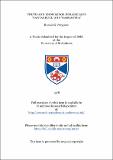Truth and knowledge in Rabelais's 'Pantagruel' and 'Gargantua'
Abstract
The basic contentions of Truth and knowledge in Rabelais's
"Pantagruel" and "Gargantua” are, first, that the theme of truth and
knowledge underlies, unifies and gives meaning to all the disparate episodes of Books I and II and, second, that Rabelais went to great
lengths to communicate his ideas on the theme of cognition in as tangible a way as possible to his general readers.
This thesis is, thus, in effect, an attempt to restore the "incompatible" elements of ‘Pantagruel’ and ‘Gargantua’ to a status of equality.
I hope to demonstrate that they are all interlocking and indispensible
parts of a fictional pattern by means of which Rabelais stimulated his
readers into
exploring two broad areas of thought (the first mainly
in ‘Pantagruel’, the second principally in ‘Gargantua’, though they overlap)
basic to his conception of truth and knowledge.
Unless it is derived from
empirical information, from primary
sources, knowledge is invalid. Second-hand, received "knowledge" -- no
matter how impressive-looking, plausible or authoritative -- cannot be
trusted to lead to the truth. One's senses are the foundation on which
cognition is constructed.
Omniscience and hence absolute truth are fatuous concepts. Their monolithic perfection is only tenable when critical reason and individual
judgement are suppressed. They are ultimately -- in those who profess
them -- the offspring of self-love. Partial knowledge and relative truth
are, however, accessible to the individual who exercises his critical
reason
(which means unbiased by "philautie") on the raw material of
first-hand information. This implies the mutual co-existence and compatibility of many relative truths —for the divergence in judgement stems
from the infinite variety of temperament. For Rabelais the absolute,
unilateral assertion does net do justice to the multifariousness of
reality. To it he opposes a philosophy of duality : by operating a reconciliation or fusion of opposing but relatively true viewpoints -- thus
transcending the purely individual judgement -- Rabelais attempts to
arrive at a closer approximation to Truth.
Type
Thesis, BPhil Bachelor of Philosophy
Collections
Items in the St Andrews Research Repository are protected by copyright, with all rights reserved, unless otherwise indicated.

